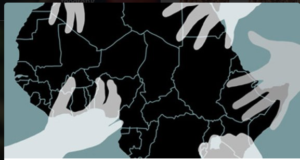Despite years of research pointing to the inadequacies of limiting global warming to 2° C, the UNFCCC scored a long awaited PR victory on Earth Day 2016 as leaders from 171 countries convened at the UN to sign the Paris Climate Agreement.
As scientists continue to issue grave warnings of major and widespread climactic catastrophes within decades, the official signing ceremony had the distinct aura of yet another expertly orchestrated climate charade: US Secretary of State John Kerry signed the Agreement with his granddaughter on his lap; UN Secretary-General Ban Ki-moon hailed the treaty as “a new covenant for the future;” and environmental evangelist Leonardo DiCaprio shared his climate science bona fides.
“After 21 years of debates and conferences it’s time to declare no more talks, no more 10-year studies, no more allowing the fossil fuel companies to manipulate and dictate the science and the policies that affect our future,” DiCaprio said. “This is the body that can do what is needed.”
2° C DEGREES: A GLOBAL CATASTROPHE
With global warming hovering at 1.34° C and 2016 temperatures on course to break all records, it’s not too much of a stretch to agree with NASA Climatologist and activist James Hansen’s depiction of the Paris treaty as a “fraud.”
“It’s just bullshit for them to say: ‘We’ll have a 2C warming target and then try to do a little better every five years.’ It’s just worthless words,” Hansen said at the conclusion of the talks last December.
Just last month Hansen re-released a study, which was first published prior to COP21, warning “soon we’ll pass the point of no return in which we lock in consequences that cannot be reversed on any time scale that people care about.”
Hansen and his co-authors say that a possibility exists, “a real danger,” that we will hand young people and future generations a climate system that is practically out of their control.
In a new Earth Systems Dynamics study Differential Climate impacts for policy -relevant limits to global warming; the case of 1.5° and 2°, researchers project that the UNFCCC’s failure to push for just .5 degree less increase in global temperatures has the potential to open the floodgates to a jaw dropping scenario within decades:
• A 30% decrease in equatorial water supply
• A polar region devastated by more severe and more frequent storms
• Devastation of reef ecosystems
• Significant failures of global crop harvests
“Some researchers have argued that there is little difference in climate change impacts between 1.5C and 2C,” notes Jacob Schewe, a member of the research team from Potsdam Institute for Climate Impact Research . “Indeed, it is necessary to account for natural variability, model uncertainties, and other factors that can obscure the picture. We did that in our study, and by focusing on key indicators at the regional level, we clearly show that there are significant differences in impacts.”
AN EVOLUTIONARY PERSPECTIVE
In an NPR 13.7 blogpost Paris Climate Agreement: Success Or Failure?, astrophysics professor Adam Frank suggests planetary survival lies in the ability of our species to evolve beyond the current paradigm of behaviors which have brought us to the edge of extinction.
Climate change, Frank suggests, can be viewed from the perspective of “humanity’s coming of age on a planetary scale”, thereby suggesting the potential for a drastic systemic shift in thinking and behavior involving collaboration and cooperation “over length and time-scales far longer than anything attempted before.”
”We can develop new ways of collectively living on a planet that sustains both its vital functions and our civilization,” Frank writes. “But the journey has only started — and it’s far from certain that we won’t be pulled back by our own, now useless, behaviors from earlier epochs.
”The most important reality is that the collective behavioral toolbox a civilization is born with may not be up to the job once that civilization advances to the point where it can alter the world that gave it birth.”

